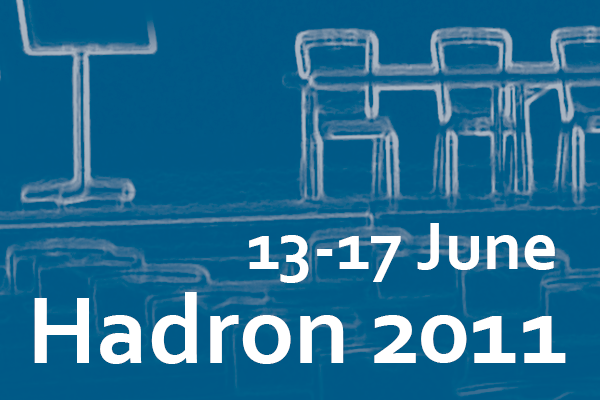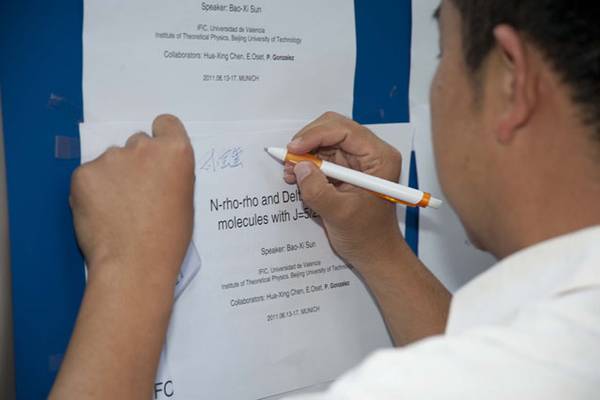Hadron2011: In Search of Exotic Particles
16.06.2011 —
These days the Künstlerhaus in Munich is staging a large international conference. At „Hadron2011“, which is taking place for the 14th time this year, around 250 scientists are concerned with the smallest building blocks the Universe has to offer – elementary particles. The topic of the conference is the particles quarks and gluons, which together form hadrons. As the building blocks of protons and neutrons they also represent the fundamental components of matter. At the 5-day conference physicists are discussing results and theoretical developments which are leading to a better understanding of the interactions and states of quarks and gluons.
Through the investigations the particle physicists are hoping to gather further findings on the interaction between the different quarks and gluons – the latter are the particles which hold the quarks together like Super Glue. The scientists assume that a better understanding of the quark-gluon constellations will also answer the question as to how stable matter was able to form from the hot plasma of the early Universe.
At Hadron2011 scientists were already able to announce a few successes: They presented several new discoveries from the particle world, which were found with the help of accelerator experiments in the USA, Japan and the Large Hadron Collider in Geneva. Scientists of the COMPASS experiment reported a breakthrough in hadron research: A team under the leadership of scientists of the Technische Universität München (TUM) succeeded in confirming the existence of exotic particles which theoretical calculation had predicted quite a while ago.
Particle combinations with a heavy b-quark, whose properties are still unclear, are causing quite a stir and provide plenty of topics for discussion. It is quite evident that they make an appearance as the partners of other lighter particles. Scientists have been wracking their brains over these particles for quite a few years as they have not yet been able to classify them in the framework of the standard model of hadron physics. Observations indicate that the interaction of quarks and antiquarks at long time intervals is still always good for a surprise.
Studies in hadron physics require a great deal of research time – the scientist Suh-Urk Chung knows this only too well. He originally came from Korea and is one of the founding members of the „Hadron“ Conference, which took place in 1983 for the first time. Since then it has been taking place every two years at different locations. „Since the first conference we have been dealing with so-called glueballs, for example, exotic particles which are composed exclusively of gluons. Theoretical considerations tell us that these particles should exist – however we still have not been able to find them yet“, the particle physicist explains.
Furthermore the conference provided the occasion to honor the theoretical physicist Harry Lipkin who celebrated his 90th birthday at Hadron2011. Lipkin is considered one of the pioneers of hadron research and is still active in scientific research.
Prof. Stephan Paul, Leader of the Excellence Cluster ‚Universe’ at the TUM and one of the two main organizers of Hadron2011 is obviously very pleased with how well the conference went: „We were able to make significant progress in a wide range of areas of hadron physics. I am very confident that not only the high-energy experiments at the Large Hadron Collider at CERN in particular, but also future experiments in Japan will deliver further exciting results. Little by little these results will help us unravel the mystery of the formation of matter in the Universe“.










